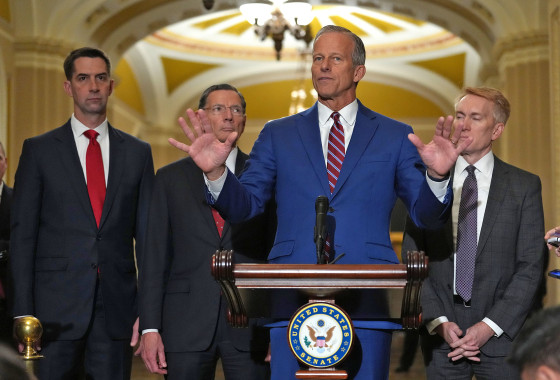The Republican Party faces an important fork in the road: Do they stand with Donald Trump who wants to add over $3 trillion to the nation’s debt or do they stand with the families and small business owners who can no longer bear that burden?
As the so-called Big Beautiful Bill limps its way from its one-vote margin in the House, Senate Republicans will have to decide how much of the president’s domestic agenda they’ll support.
But whether they realize it or not, they’ll also be debating the future of the Republican Party. Is it a party of Trump — tossing new parents, tipped workers and seniors a few crumbs while cutting the social safety net and giving very wealthy individuals a massive tax cut? Or are there enough old-school conservatives left to make the bill more economically responsible?
Let’s be clear: This isn’t a battle over fiscal prudence. It is a battle over obedience. If they side with Trump, they’ll have to defend cutting programs like Medicaid and SNAP. They will have to answer to constituents who will feel the direct effects of their vote. We are not talking about the price of eggs anymore. We are talking about the cost of healthcare–or having access to healthcare at all. Do they think the voters won’t remember who took their safety net away?
But this is also a battle between the remnants of traditional conservative philosophies about managing the nation’s debt versus unfettered economic retribution at the hands of Trump. It’s no secret that the Republican Party is a shell of its former self, even as it insists that it’s not. The bill is touted as a display of conservative consensus, but Trump’s economic vision has never had a consensus because he is not a fiscal conservative. His presidency is defined by underfunded tax cuts, record deficits and erratic tariffs that hurt American consumers — if not the global order.
Despite all the Republican noise and infighting over the nation’s debt and the deficits they continue to create, today’s Republican Party has long since exchanged what’s left of any“economic policy” for the incoherent economic whims of Trump. Consequently, Republican lawmakers aren’t being asked to pass legislation. They’re being asked to participate in a loyalty test.
The bill still faces significant hurdles, as Republican senators indicate that they want substantial changes, even though they appear to disagree on what those changes would be. Kentucky Sen. Rand Paul derided the spending cuts as “wimpy and anemic,” while Wisconsin Sen. Ron Johnson — a staunch fiscal conservative — described the bill’s financial impact as “mortgaging our children’s future.”
The Republicans opposing the bill may sound skeptical, but let’s not mistake delay for daring. This bill may die in the Senate or undergo significant changes, but the questions it raises will linger far longer. The real fight playing out on that Senate floor isn’t over the size of the government, but the size of Trump’s shadow. Blocking the bill would require the courage to stand up to the nihilism that has consumed the modern-day Republican Party. So far, no one seems willing to truly risk their political careers on principle.
Which is why Trump remains so smug about passage of his “Big Beautiful Bill."
In reality, this bill has come to represent what Trump believes he can control–Republican members of Congress, regardless of who they represent or the states they come from. What Trump wants holds greater value for them than what their constituents need.
Are Republican senators willing to stand up to Trump?
We’ll know the answer soon. Although, somehow I believe we already do.
For more thought-provoking insights from Michael Steele, Alicia Menendez and Symone Sanders-Townsend, watch “The Weeknight” every Monday-Friday at 7 p.m. ET on MSNBC.

